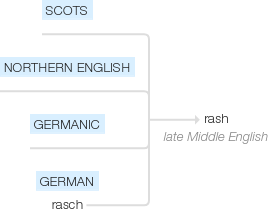Rash
late Middle English (also in Scots and northern English in the sense ‘nimble, eager’): of Germanic origin; related to German rasch .
wiktionary
From Middle English rash, rasch(“hasty, headstrong”), from Old English *ræsc("rash"; found in derivatives: ræscan(“to move rapidly, flicker, flash, quiver, glitter”), ræscettan(“to crackle, sparkle”), etc.), from Proto-Germanic *raskaz, *raskuz, *raþskaz, *raþskuz(“rash, rapid”), from Proto-Indo-European *ret-(“to run, roll”). Cognate with Dutch rasch, ras(“rash, snell”), Middle Low German rasch(“rash”), German rasch(“rash, swift”), Swedish rask(“brisk, quick, rash”), Icelandic röskur(“strong, vigorous”).
Likely from Old French rasche(“rash, scurf”), from Vulgar Latin root *rāsicāre(“to scrape”), from Latin rāsus(“scraped, scratched”), from Latin rādō(“I scratch, scrape”). More at raze/ rase.
Compare French ras(“short-nap cloth”), Italian and Spanish raso, satin, or Italian rascia(“serge”), German Rasch, probably from Arras in France.
For arace
etymonline
rash (adj.)
late 14c., "nimble, quick, vigorous" (early 14c. as a surname), a Scottish and northern word, perhaps from a survival of Old English -ræsc (as in ligræsc "flash of lightning") or one of its Germanic cognates, from Proto-Germanic *raskuz (source also of Middle Low German rasch, Middle Dutch rasc "quick, swift," German rasch "quick, fast," Danish rask "brisk, quick"). Related to Old English horsc "quick-witted."
The original senses in English now are obsolete. Sense of "reckless, impetuous, heedless of consequences, hasty in council or action" is attested from c. 1500. Related: Rashly; rashness.
Rashness has the vigor of the Anglo-Saxon, temerity the selectness and dignity of the Latin. Temerity implies personal danger, physical or other .... Rashness is broader in this respect. Rashness goes by the feelings without the judgment ; temerity rather disregards the judgment. Temerity refers rather to the disposition, rashness to the conduct. [Century Dictionary]
rash (n.)
"eruption of small red spots on skin," 1709, perhaps from French rache "a sore" (Old French rasche "rash, scurf"), from Vulgar Latin *rasicare "to scrape" (also source of Old Provençal rascar, Spanish rascar "to scrape, scratch," Italian raschina "itch"), a variant of classical Latin rasitare, from Latin rasus "scraped," past participle of radere "to scrape" (see raze (v.)). The connecting notion would be of itching. The figurative sense of "any sudden outbreak or proliferation" is recorded by 1820.
